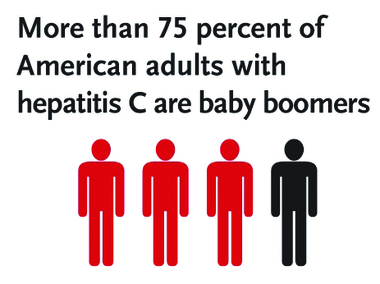CDC recommends baby boomers receive hepatitis C test

(Centers for Disease Control and Prevention) All U.S. baby boomers should get a one-time test for the hepatitis C virus, according to recommendations by the Centers for Disease Control and Prevention. One in 30 baby boomers – the generation born from 1945 through 1965 – has been infected with hepatitis C, and most don’t know it. Hepatitis C causes serious liver diseases, including liver cancer (the fastest-rising cause of cancer-related deaths) and is the leading cause of liver transplants in the United States.
“Identifying these hidden infections early will allow more baby boomers to receive care and treatment, before they develop life-threatening liver disease and could potentially save tens of thousands of lives,” according to Kevin Fenton, M.D., director of CDC’s National Center for HIV/AIDS, Viral Hepatitis, STD and Tuberculosis Prevention.
CDC’s previous recommendations called for testing only individuals with certain known risk factors for hepatitis C infection. Risk-based screening will continue to be important, but is not sufficient alone. More than 2 million U.S. baby boomers are infected with hepatitis C – accounting for more than 75 percent of all American adults living with the virus. Studies show that many baby boomers were infected with the virus decades ago, do not perceive themselves to be at risk, and have never been screened.
More than 15,000 Americans, most of them baby boomers, die each year from hepatitis C-related illness, such as cirrhosis and liver cancer, and deaths have been increasing steadily for over a decade and are projected to grow significantly in coming years.
CDC estimates one-time hepatitis C testing of baby boomers could identify more than 800,000 additional people with hepatitis C. And with newly available therapies that can cure up to 75 percent of infections, expanded testing – along with linkage to appropriate care and treatment – would prevent the costly consequences of liver cancer and other chronic liver diseases and save more than 120,000 lives.
For additional information about hepatitis, visit www.cdc.gov/hepatitis.





